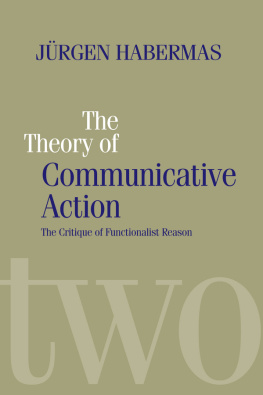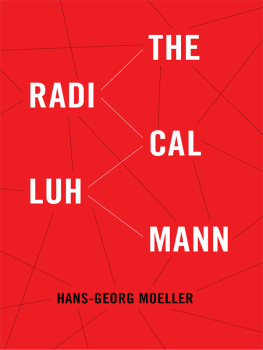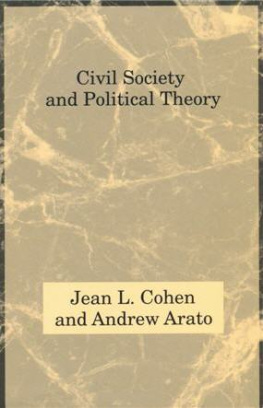theory of society, volume 1
Cultural Memory in the Present
Mieke Bal and Hent de Vries, Editors
THEORY OF SOCIETY VOLUME 1
Niklas Luhmann
Translated by Rhodes Barrett
stanford university press
stanford, california
Stanford University Press
Stanford, California
English translation 2012 by the Board of Trustees of the Leland Stanford Junior University. All rights reserved.
Theory of Society, Volume 1 was originally published in German under the title Die Gesellschaft der Gesellschaft. Band Suhrkamp Verlag Frankfurt am Main 1997.
The translation of this work has been published with the assistance of the Volkswagen Foundation.
No part of this book may be reproduced or transmitted in any form or by any means, electronic or mechanical, including photocopying and recording, or in any information storage or retrieval system without the prior written permission of Stanford University Press.
Printed in the United States of America on acid-free, archival-quality paper
Library of Congress Cataloging-in-Publication Data
Luhmann, Niklas, 19271998, author.
[Gesellschaft der Gesellschaft. English]
Theory of society / Niklas Luhmann ; translated by Rhodes Barrett.
2 volumes cm.--(Cultural memory in the present)
Originally published in German under the title Die Gesellschaft der
Gesellschaft.
Includes bibliographical references and index.
ISBN 978-0-8047-3949-8 (cloth : alk. paper)--ISBN 978-0-8047-3950-4 (pbk. :
alk. paper)
1. Sociology. 2. Social systems. 3. Communication. I. Title. II. Series: Cultural
memory in the present.
HM590.L84513 2012
301--dc23
2012021883
Typeset by Bruce Lundquist in 11/13.5 Adobe Garamond
Id quod per aliud non potest concipi, per se concipi debet.
spinoza , Ethica I, Axiomata II
That which cannot be conceived through anything else must be conceived through itself (trans. R.H.M. Elwes [1883]).
Preface
On my appointment to the Department of Sociology established at the University of Bielefeld in 1969, I was asked what research projects I had running. My project was, and ever since has been, the theory of society; term: thirty years; costs: none. As far as the time frame was concerned, my estimation of the difficulties was realistic. At that time, the literature in sociology gave little cause to consider such a project possible at all, not least because neo-Marxist precepts blocked any ambition of producing a theory of society. My discussion with Jrgen Habermas was published shortly afterward under the title Theorie der Gesellschaft oder Sozialtechnologie Was leistet die Systemforschung? (Theory of Society or Social Technology: What Does Systems Research Accomplish?) [Frankfurt, 1971]. The irony of the title was that neither author wished to stand up for social technology, but we differed on what a theory of society ought to be; and it is symptomatic that the theory of society first came to public attention in the form, not of a theory, but of a controversy.
My initial plan had been to publish the theory of society in three parts: an introductory chapter on systems theory, a treatment of the societal system, and a third part dealing with the most important functional systems of society. The basic concept has remained, but I have had to correct my ideas about the size of the undertaking more than once. In 1984, I brought out the introductory chapter in book form under the title Soziale Systeme: Grundri einer allgemeinen Theorie (Social Systems: Outline of a General Theory).1 In essence, my aim was to apply the concept of self-referential operation to the theory of social systems. This aim has not fundamentally changed, although progress in general systems theory and epistemological constructivism has repeatedly offered opportunities to extend it. Some contributions have been published in collections of essays under the title Soziologische Aufklrung (Sociological Enlightenment). Other material is available only in manuscript form or has fed into this book.
Since the early 1980s, it has become increasingly clear how important the comparability of functional systems is for the theory of society. This had already been a basic consideration in Talcott Parsonss theory construction. The theoretical importance of comparability is even greater if we concede that society cannot be deduced from a principle or a basic norm, be it the customary justice, solidarity, or reasoned consensus. For even those who do not recognize or who violate such principles contribute to societal operations, and society itself must take account of this possibility. On the other hand, it is not by chance that widely differing functional areas such as science and law, economics and politics, the mass media, and intimate relations can be shown to have comparable structuresnot least because their differentiation requires systems to be formed. But can this be shown? Parsons attempted to guarantee it through the analytic of the action concept. If the thought is not convincingly elaborated, we can do no more than formulate theories for individual functional systems and test whether, despite all differences between fields, we can work with the same conceptual apparatusincluding autopoiesis and operational closure, first- and second-order observation, self-description, medium and form, coding and, in orthogonal relation thereto, the distinction between self-reference and other-reference as internal structure.
As a result, I gave priority to theories for individual functional systems. The following have already been published: Die Wirtschaft der Gesell schaft (The Economy as a Social System) (1988), Die Wissenschaft der Gesellschaft (Science as a Social System) (1990), Das Recht der Gesellschaft (Law as a Social System) (1993),2 and Die Kunst der Gesellschaft (Art as a Social System) (1995).3 Further texts of this type are to follow. Meanwhile, however, work on the theory of the societal system had also progressed. I had produced several thousand pages of manuscript, partly to accompany lectures, without having put the material in publishable form. My then secretary retired and the position was frozen for many months. In this situation, the University in Lecce offered me an opportunity to work. So I fled to Italy with the project and the manuscripts. There I wrote a short version of the theory of society, which, translated into Italian, revised several times and adapted for use at an Italian university, has since been published.4 The manuscript then produced became the basis for a more extensive German edition, on which, once again provided with a secretary, I was able to work in Bielefeld. The present text is the result of this eventful history.
The system under consideration is that of society itself, as opposed to all social systems that develop within society in the performance of societal operations: the functional systems of society, as well as interaction systems, organizational systems, and social movements, all of which presuppose that a system of society has already been constituted. The key issue is therefore what operation produces and reproduces this system whenever it occurs. The answer, discussed in Chapter 2, is communication. It is a circular relationship: society cannot be conceived of without communication, nor can communication be conceived of without society. Questions of genesis and morphogenesis cannot be answered by any hypothesis of origin and are obscured rather than resolved by the thesis that the human being is genuinely social in nature. Chapter 3 entrusts these questions to an appropriate evolution theory.
The thesis of self-production by communication postulates clear boundaries between system and environment. The reproduction of communications from communications takes place in society. All further physical, chemical, organic, neurophysiological, and mental conditions are environmental conditions. Society can substitute for them within the limits of its own operational capabilities. No human being is indispensable to society. This naturally does not mean that communication is possible without consciousness, without brains well supplied with blood, without life, without a moderate climate.
Next page






